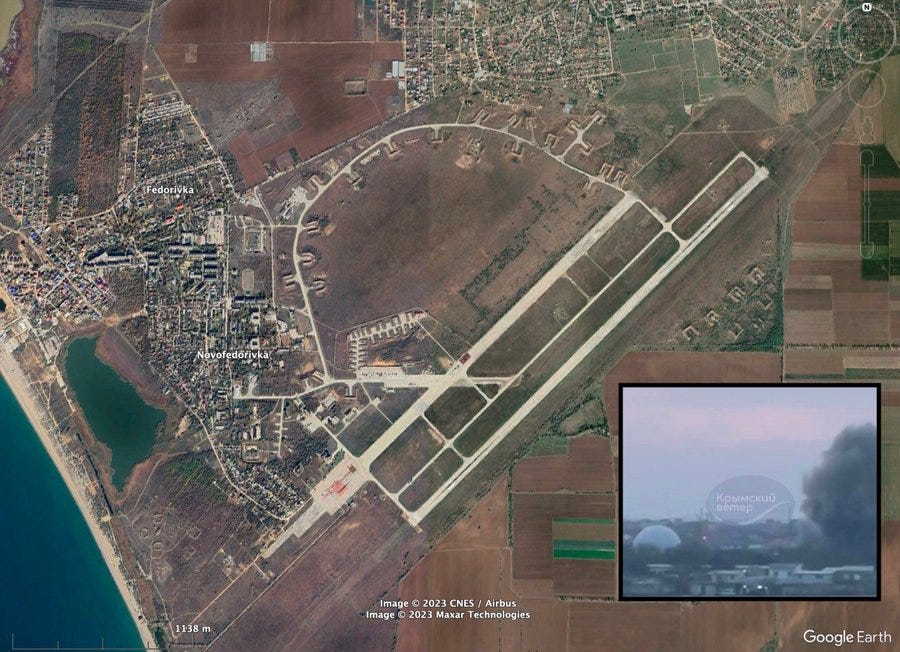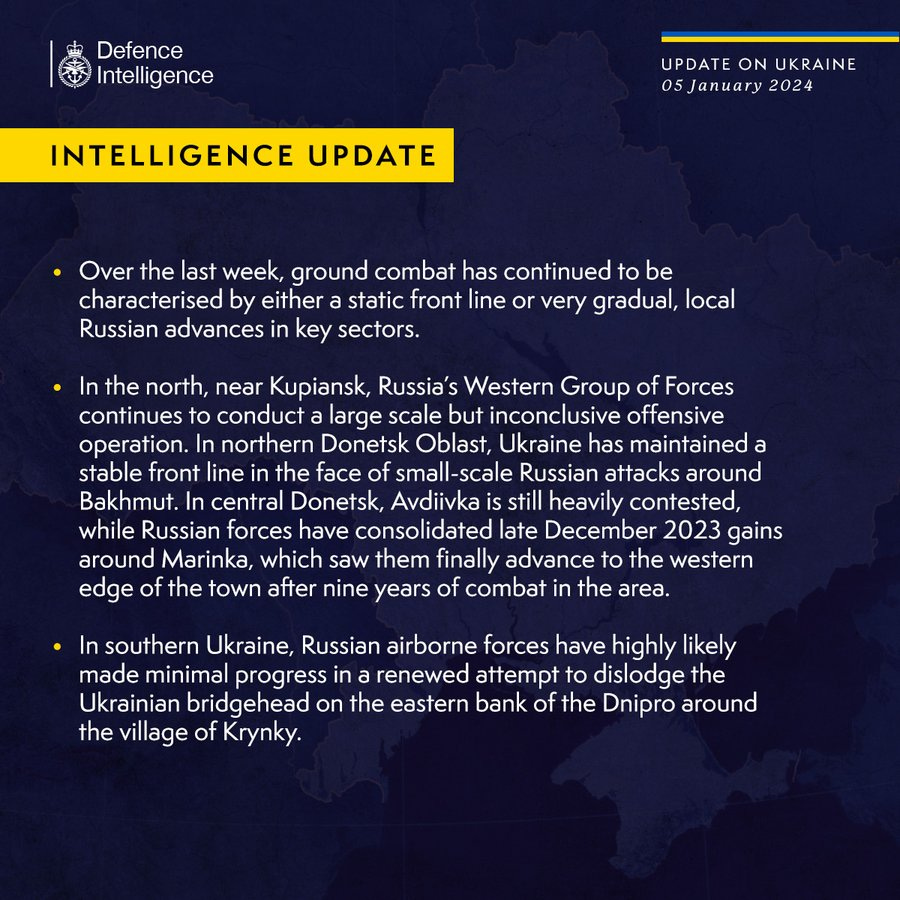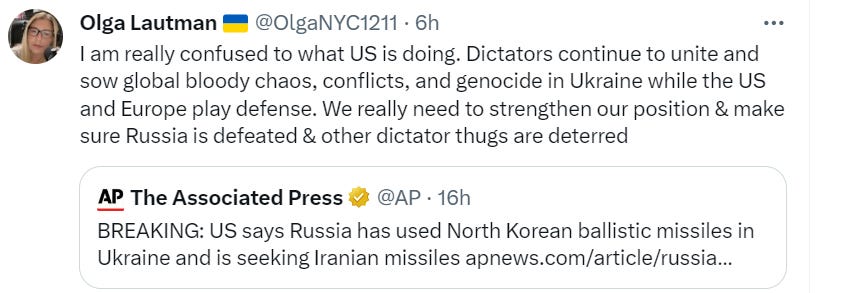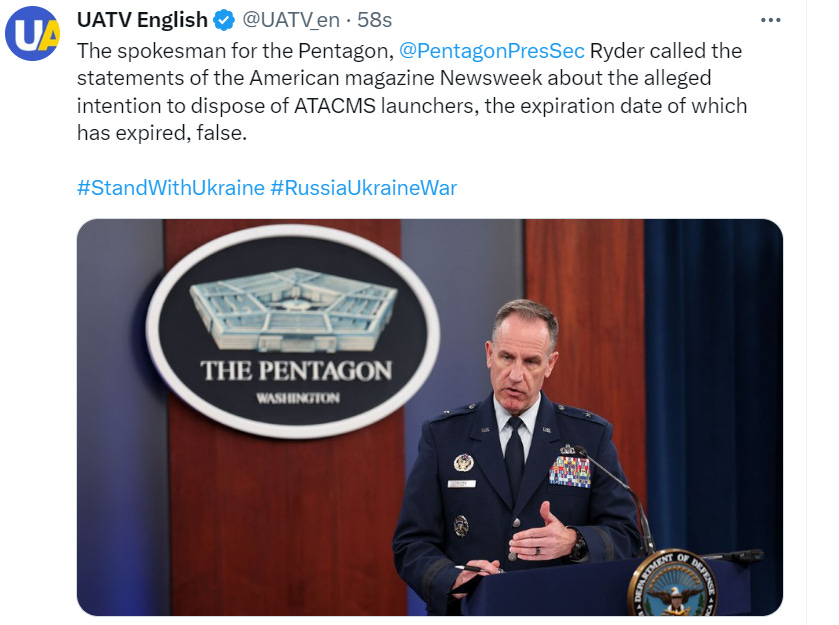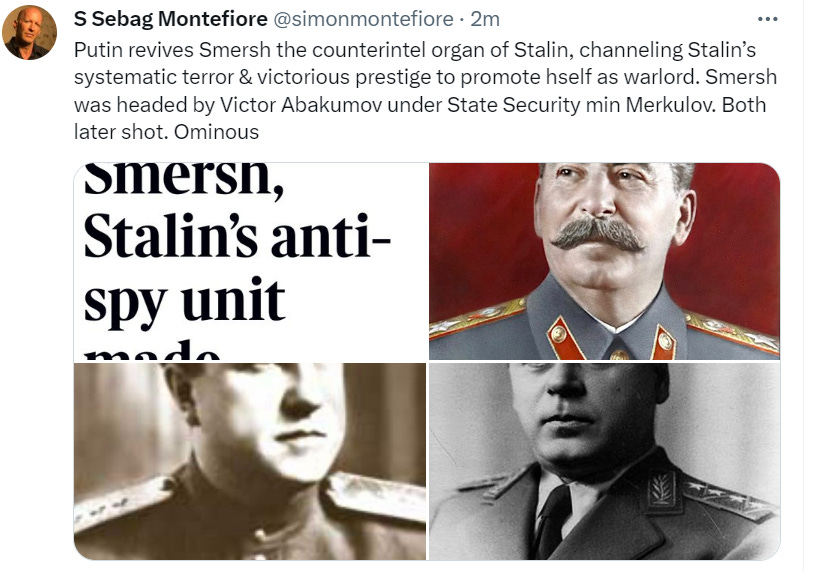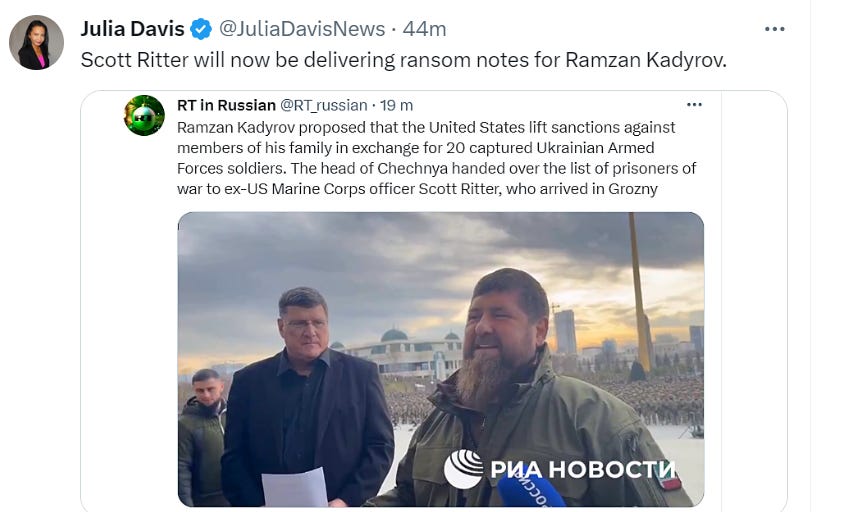Jan 6: E-Stories
Day682 20DaysinMariupol Kharkiv CombatSit BehindLines NorKor Iran InRussia Allies A&P Kokcharov UKDef ISW TimesRad Lautman Eckel Mamedov Montefiore Olenjnik Davis Rosenberg Stravridis Zakaria
Catching up…
EA Worldview’s Ukraine Up-date- hop over to Scott’s amazing hourly Ukraine up-date page. I’ll fill in with some bits and bobs.
20 Days in Mariupol. Please watch it. You’ll never be the same.
Stories we’re following…
Ukraine’s air force said that its forces shot down 21 out of 29 Shahed drones launched by Russia. The drones were downed in Mykolaiv, Kherson, Dnipropetrovsk, Cherkasy, Kirovohrad and Khmelnytskyi regions, the statement said.
DTEK: Russian attacks target, damage front-line power plant again. DTEK, Ukraine's biggest private energy company, said the plant struck on Jan. 4 had been attacked more than a dozen times in the past 2.5 months. In one Russian strike, five workers were injured.
The Ukrianian Foreign Ministry released
Update: 2 killed, 62 injured in Russian Jan. 2 strike against Kharkiv. As a result of a Russian missile strike against Kharkiv on Jan. 2, one more woman died in the hospital, and a 23-year-old woman sought medical care due to contusion, the regional prosecutor's office reported on Jan. 4.
Russian attacks kill 3, injure 9 over past day. In Donetsk Oblast, one civilian was killed and another injured in Avdiivka, said the Donetsk Oblast Military Administration. One person was also reported wounded in Toretsk and another in Hirnyk.
Russia attacks industrial facility in Kirovohrad Oblast, kills 1, injures 1. A Russian missile strike against an industrial facility in Kirovohrad Oblast's Kropyvnytskyi on Jan. 4 killed one civilian and injured another, Governor Andrii Raikovych reported.
Aerial targets shot down over Belgorod, 2 reportedly injured. Russian air defense units shot down multiple targets over Belgorod and the Belgorod region during the evening hours of Jan. 4, reportedly injuring two individuals, Oblast Governor Vyacheslav Gladkov alleged via Telegram.
Military: Ukrainian strike hits ammunition warehouses in occupied Crimea. Ukrainian forces struck on Jan. 4 Russian ammunition warehouses near the village of Pervomaiske in Russian-occupied Crimea, the Strategic Communications Directorate of Ukraine’s Armed Forces reported on Jan. 5.
Ukraine says it caused “serious damage” to Russia’s defence systems on the Crimean peninsula during an attack on a military command post there on Thursday.
“Not only was one command post hit, really powerful combat work took place over the past 24 hours, including causing serious damage to the defence system on the Crimean peninsula,” said Natalya Gumenyuk, a spokesperson for the Defence Forces of southern Ukraine.
Combat Situation Update
Russian media: Blackouts reported in Moscow following energy facility fire. The Russian Telegram news channel Mash reported that the fire erupted at a substation in northeastern Moscow at around 6 a.m. local time, causing outages in the municipal districts of Otradnoye, Bibirevo, as well as Northern and Southern Medvedkovo.
Zelensky visited the Avdiivka front and met fighters of the 110th mechanized brigade, responsible among other brigades for the defense of the city.
"The 110th separate mechanized brigade is defending Ukraine as part of the Tavria operational and strategic grouping of troops in the Avdiivka direction. Last week, I personally visited the positions of our warriors in Avdiivka and thanked them for their steadfastness in battles," he emphasized.
Telegraph reports that Russia is preparing to attack Kupyansk and its surroundings on January 15, indicated by recently increased large-scale missile attacks in the Kharkiv region. Russia may be planning to intensify such attacks from January 7 onwards.
“In the near future, the adversary forces, specifically the 27th Separate Motorized Rifle Brigade and the 7th Motorized Rifle Regiment of the 11th Army Corps of the Russian Baltic Fleet, will persist in their attempts to break through to Petropavlivka and towards the R-07 Kupyansk – Svatove road in the area of Stepova Novoselivka from the north and northeast. They will also resume attacks in the directions of Kuzemivka – Berestove and Kuzemivka – Stelmakhivka.”
In most other directions in the southeast, the Russian forces will attempt to take advanced positions according to the CDS assessment. So all eyes on the Russian offensive across the entire front quite frankly.
The Commander-in-Chief of the Armed Forces of Ukraine Valery Zaluzhnyi spoke with the Supreme Commander of the Joint Forces of NATO in Europe, the Commander of the US Armed Forces in Europe, General Christopher Cavoli.
"Told about the situation at the front. The operational and strategic situation remains difficult, but controlled. The Armed Forces of Ukraine continue to conduct defensive operations, concentrate on repelling enemy attacks and inflicting maximum losses in manpower and equipment. General Cavoli discussed in detail the possible actions of the enemy, which are expected in the coming weeks and months.”
This is a very important interview with Hamish de Bretton-Gordon.
Commander: Russia doubles attacks in southeastern sector. Over the past day, Tarnavskyi said that Russian forces in the sector had launched almost 900 artillery barrages, 25 airstrikes, and dozens of assaults on Ukrainian positions. As a result of the clashes, Russia suffered heavy losses, including 423 personnel and 72 pieces of military equipment.
Ukraine's Air Force can't confirm yet that Russia has used North Korean missiles in Ukraine. Ukrainian Air Force spokesperson Yurii Ihnat said that Ukrainian specialists are yet to study the fragments and identify if they can be definitively traced to North Korea.
UK condemns Russia's use of North Korean missiles. A spokesperson for the British Foreign Office said:
The UK strongly condemns Russia’s decision to use ballistic missiles sourced from North Korea in recent attacks against Ukraine. We urge North Korea to cease its arms supply to Russia.
Russia is turning to North Korea for its weapons in pursuit of its cynical and ill-conceived military aims in Ukraine. This is symptomatic of its isolation on the world stage and a sign of its desperation. Furthermore, this activity is in violation of multiple UN security council resolutions – which Russia supported as a permanent member.
Any support for North Korea’s own illegal weapons programmes risks significantly undermining the UN’s long-standing commitment to security, and further destabilising the region.
North Korea is subject to a robust sanctions regime, and we will continue to work with our partners to ensure that North Korea pays a high price for supporting Russia’s illegal war in Ukraine.
White House: Russia fires North Korea-supplied missiles into Ukraine. Unnamed U.S. officials previously told the Wall Street Journal and the Washington Post that North Korea has provided Russia with launchers and several dozen ballistic missiles. Kirby’s statement is the first official report of Russia deploying these missiles.
Me: There’s a lot of discontent at the moment about the inability of the U.S. Congress to unblock aid to Ukraine, especially since Iran and North Korea are supplying armaments to Russia. Olga and I talk about this in the up-coming Kremlin File episode. The U.S. seems like a reluctant or unreliable partner to Ukraine. Kirby’s statements yesterday were discouraging. American lawmakers are playing with fire: leadership and partnership is not something you show sporadically: it’s based on trust and that is built over time and through concrete action.
As an Italian, I understand that. Italy’s dalliance with Putin’s Russia during the Conte I and Conte II governments isolated Italy in the international arena, and especially with NATO members. I don’t doubt that intelligence sharing diminished in that period as we were thought of as a risk. It was perfectly visible at G7 meetings.
Update and correction: This statement gives hope that the ATACMS can still be sent to Ukraine.
Behind the Lines
On January 2, occupation administrations in the temporarily occupied Kherson Oblast initiated the widespread installation of TV reception equipment, featuring propaganda channels, in private residences. At least 30 residential buildings in Henichesk, 18 residential buildings in Skadovsk, and a number of buildings on the outskirts of Zaliznyi Port have been identified as recipients of this equipment, as reported by the Southern Defense Forces.
SBU uncovers scheme to help Ukrainians evading mobilization escape to Transnistria. As part of the joint operation, the SBU and its Moldovan counterparts caught conspirators both in Transnistria and Odesa. The main organizers of the scheme were from Transnistria and had both Moldovan and Ukrainian passports.
Zaluzhnyi, Umerov start talks with parliamentary committee on new mobilization law. Commander-in-Chief Valerii Zaluzhnyi and Defense Minister Rustem Umerov arrived at Ukraine's parliament for talks on the new law on mobilization, David Arakhamia, head of President Volodymyr Zelensky's Servant of the People faction, reported on Telegram on Jan. 4.
National Resistance Center: Russian occupation authorities to force Ukrainian teenagers into military registration. The move is part of Russia’s preparations for a mass mobilization campaign in the occupied territories of Ukraine, according to the center run by the Ukrainian military. The Kyiv Independent could not immediately verify this information.
The news of a North Korean attack towards South Korea's Yeonpyeong and Baengnyeong islands is currently trending in Russian Telegram channels. I’ll be watching to see if this has been verified by Western authorities.
Nepal stops issuing permits for Russia work after soldiers killed. Nepal has decided to stop issuing permits for its citizens to work in Russia and Ukraine, Reuters reported. The move came after at least 10 Nepali soldiers were killed while serving in the Russian military.
Polish official on reported Russian missile in Poland's airspace: We cannot rule out provocation. Jacek Siewiera, the head of Poland's National Security Bureau, said that Polish authorities "have enough information to confirm that this missile was launched from Russian systems."
Tusk vows to convince Polish carriers to halt their blockade. Polish Prime Minister Donald Tusk said he would convince Polish carriers blocking the border with Ukraine not to use such methods, the Polish Press Agency (PAP) reported on Jan. 3.
Foreign Ministry condemns event on Russia's 'rebirth' of Mariupol to be held in Italy. Ukraine's Foreign Ministry condemned an event on the "rebirth" of Mariupol after Russia's brutal siege, planned by an Italian pro-Russian association, as propaganda and a provocation, Ukrainska Pravda reported on Jan. 4, citing Foreign Ministry Spokesperson Oleh Nikolenko.
Me: I’ll be publishing a paper I wrote about Russian active measures in Italy under the Conte I and Conte II governments and their direct effect on Italian politics. In the meantime, I’m bringing an association and its network to public attention.
The Association Vento dell’Est is a continuation of the Russian operations it has conducted in Italy since 2014. On the association’s website the association claims that they began operations in October 2022, but on their Telegram channel, they changed the Telegram channel name to the association name after November 8, 2022.
VdE’s president is Lorenzo Berti, who was a member of Casapound, a fascist organisation based in Rome, joined the League in 2021 to run as mayor of Pistoia (Tuscany) in the municipal elections. He has travelled to Crimea and Donbas quite a few times according to his Telegram and Instagram posts. At VdE’s events in Tuscany and other regions feature speakers who are embedded in Donbas, or who have served as ‘election observers’ for Russia in occupied Crimea, occupied Donbas and Russia.
VdE is part of a network which includes neo-fascist groups based in Rome (La Voce del Silenzio and RER), publishing houses, media outlets, platform for donations, and speakers for events. An affiliated publishing house released a collection of Daria Dugina’s ‘poetry’, and VdE sold copies of the collection at events all through the summer and fall 2023. Accompanying their events are signs and framed photos of Russian Orthodox religious icons.
The photos and promotional information posted on their social media network sites demonstrate that they have the backing of some sort of Russian organisation but investigation is necessary into their finances. Owing to Italy’s lack of transparency in foreign donations for associations, this will be difficult to establish without a doubt. As an analyst focusing on political warfare, the association and its network is part of Russia’s influence operations in Italy.
Meanwhile in Russia
ISW: Russia begins negotiations with Algeria, Saudi Arabia, UAE to open Russian cultural centers. Russia has begun negotiations with Algeria, Saudi Arabia, and the United Arab Emirates (UAE) to open Russian cultural centers, likely aimed at increasing Russian influence in the Middle East and North Africa, the Institute for the Study of War (ISW) wrote in its assessment on Jan. 4.
German arms giant, Rheinmetall, has a huge manufacturing factory in Sardegna, Italy. Due to irregularities in the procedures to enlarge the plant, the Italian prosecutor has not allowed the plant to begin producing the amounts required for Ukraine. Right now the plant is producing 30 150mm shells per day. The plant could produce 26,000 shells per day, and triple that number within very little time. These are essential to Ukraine on the battlefield. The project would also increase the employment which for the island of Sardegna is necessary. We could be doing much more. The Russians are manufacturing in former bakeries. My heart sinks.
The investment company ABH Holdings, which owned Sense Bank (formerly Alfa-Bank Ukraine), filed a lawsuit against Ukraine for a billion dollars for nationalizing the bank, the company’s press service reports. The press release said the request for arbitration and statement of claim were filed with the International Center for the Settlement of Investment Disputes (ICSID).
42 foreign-made components were found in a Russian X-59 S mitessile, the National Agency for the Prevention of Corruption (NAPC) reports.
The agency recalled that it is with these missiles, in combination with Shahed-type drones, that Russia regularly attacks Ukraine. For example, on January 4, Russian troops attacked Kropyvnytskyi, Kirovograd region, with a missile of this type, killing a local resident and injuring eight other people.
“We cannot allow foreign technologies and components to continue to become part of the aggressors’ weapons,” the NAPC emphasized. The agency also noted that it has entered the relevant information into an open database of foreign components used in the production of weapons.
Steve Rosenberg for BBC: A fisherman is super happy about Putin because now they have tangerines. That’s a great slogan: Vote Putin and you get tangerines. Steve always travels 60 miles to do interviews.
Allied Support
Germany sends Skynex air defense system, other military aid to Ukraine. Germany handed over a Skynex air defense system, 10 Marder armored vehicles, ammunition for Leopard tanks, and other aid in its latest delivery to Ukraine, the German government announced on Jan. 4.
Grant Shapps, the British secretary of state for defence, said today that “together with our partners we’ll make sure North Korea pays a high price for supporting Russia.” The comments came after the White House said on Thursday it has information indicating that North Korea recently provided Russia with ballistic missile launchers and several dozen ballistic missiles.
Finland intends to ban imports of Russian LNG from 2025, Climate and Environment Minister Kai Mykkänen told the Helsingin Sanomat. “I don’t want to promise a specific date, but hopefully next year we will be in a situation where the ban comes into force,” Mykkänen said.
Sweden to withdraw aid to Mali over its support of Russia. "When we cooperate with other countries, we also want those countries to cooperate with Sweden, but Mali's military junta instead turns to Russia and supports its war," said Johan Forssel, Swedish foreign minister.
I’m sure the Houthis are shaking in their boots.
Fareed Zakaria GPS: 2024 is the Year of Elections
As for trends, Pratap Bhanu Mehta writes that nationalism remains strong as a political force (and tool) and will loom over 2024’s votes, dividing and polarizing. Examining social media’s role in elections, Jan-Werner Müller writes that social media is “particularly useful for populists” in that it “allows for what can seem like a direct connection between political leaders and potential followers.” But while social media has generated high anxiety about warped politics, Müller writes that the problem isn’t as severe as some critics had expected: “Filter bubbles—or online echo chambers curated by algorithms—exist but are much less common than often assumed; they are not the main cause of polarization, even as they help spread disinformation and propaganda more swiftly; and our offline life is in many ways less diverse than our online existence.”
Me: information warfare campaigns are tools of political warfare, and social media is used as a vector for information warfare campaigns by malign actor states. I challenge the framing of the comment above: Muller is talking about one election cycle and the effects social media can have on it to sway voters one way or another, including widening the divides within publics.
However, as analysts we look to the effects of social media over an extended period of time because malign actor states, such as Russia, China and Iran, use social media for the long-game, not immediate results.. Totalitarian regimes wage offensive information warfare as a matter of policy, while Western governments react defensively to information warfare initiatives. Western governments rarely wage strategic information operations. It is the cumulative effect that must be studied, not the most recent trends.
Russian narratives that exacerbate divisions within Western audiences were seeded one hundred years ago and then nurtured ever since via diverse forms of media. The methodology was honed by an Italian communist, Antonio Gramsci, which he called “cultural hegemony”: the shaping of perceptions of the Soviet Union and the United States and its allies from within the target nation by penetrating all forms of cultural expression. Financing universities, media publications, concerts, schools, unions, concerts, and trips, to name a few, are vectors to bring Western publics in line with Russian goals.
The Soviets in the past and the Russians today have been highly successful in influencing Western publics to bring them closer to Russian strategic aims. Their operations work, but they must been seen in the long-term, not the short-term.





